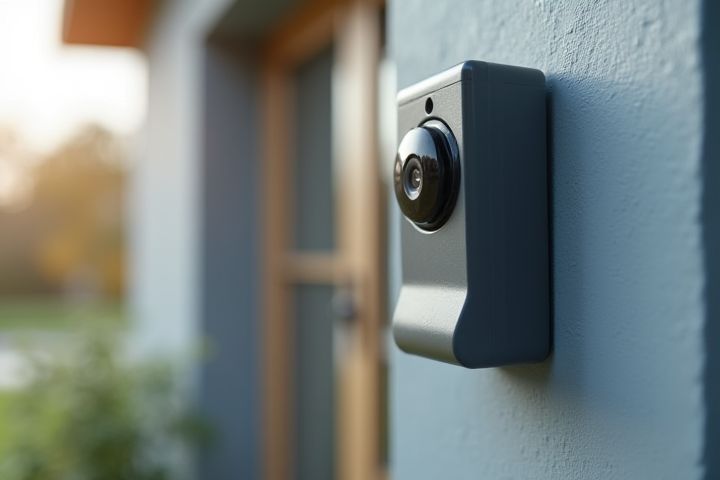
When selecting a house security system, prioritize features such as surveillance cameras, motion detectors, and door/window sensors. Evaluate the system's compatibility with smart home devices, as integration can enhance overall security and convenience through remote monitoring. Consider the installation options, whether DIY or professional, to ensure optimal placement of devices for maximum effectiveness. Research the company's reputation and customer service, as a reliable provider will improve the longevity and reliability of your security system. Lastly, assess the ongoing costs, including subscription fees for monitoring services and maintenance, to align with your budget while ensuring peace of mind.
What To Consider For House Security Systems
Type of system
When choosing a house security system, consider three primary types: wired, wireless, and hybrid systems. Wired systems often provide more reliable connections, making them ideal for larger homes, while wireless systems offer flexibility and easier installation, perfect for renters or smaller spaces. Hybrid systems combine the benefits of both, allowing you to strategically place sensors and cameras for optimal coverage. Evaluate your specific layout and security needs to determine which type aligns best with your lifestyle and budget.
Monitoring options
When selecting a house security system, consider the various monitoring options available to ensure effective surveillance. Professional monitoring services typically operate 24/7, providing immediate alerts to emergency personnel for as low as $20 to $60 per month. Alternatively, self-monitored systems leverage mobile apps, allowing you to receive notifications and control your home security remotely, often with no monthly fees. Additionally, advanced systems may integrate smart technology features, such as video doorbells and motion sensors, giving you comprehensive visibility and control over your property.
Installation process
When exploring house security systems, the installation process is crucial for optimal performance. You should evaluate whether you prefer a DIY setup, which often takes just a few hours using user-friendly tools and guides, or a professional installation that can take up to a full day but ensures proper placement and integration. Checking local regulations may also be necessary, as some areas require permits, especially for wired systems. Furthermore, consider compatibility with smart home devices, as seamless integration can enhance overall security efficiency, providing real-time alerts and remote monitoring options.
Smart home integration
When choosing a house security system with smart home integration, prioritize compatibility with existing devices, such as smart locks, cameras, and alarms, to create a cohesive ecosystem. Look for systems that support automation features, allowing you to schedule routines and remotely control devices via smartphone apps, ensuring you maintain security even when away. Evaluate the system's scalability, as you may want to expand with additional sensors or devices over time; being able to add up to 10 additional cameras can significantly enhance your surveillance. Finally, consider systems that offer robust encryption and regular software updates to protect your home network from potential cyber threats.
Range and coverage
When evaluating house security systems, consider the range and coverage of the devices to ensure every corner of your property is protected. Look for systems that provide a minimum coverage radius of 300 feet for outdoor sensors and up to 150 feet for indoor units, allowing for comprehensive surveillance. Wireless security cameras with at least 1080p resolution and night vision capabilities can enhance your monitoring efforts during low-light conditions. Keep in mind that obstacles such as walls and trees can affect signal strength, so a system with multiple base stations or repeaters may be necessary for larger homes.
Battery backup
When selecting a house security system, prioritize a model with a robust battery backup to ensure continuous operation during power outages. Look for systems that offer at least 24 hours of battery life, which can maintain functionality and keep your property secure when electricity is interrupted. A reliable battery backup should include features like automatic power management and alerts, informing you of low battery levels to prevent system failure. Assess the ease of battery replacement and charging options, as this will impact your system's long-term reliability and maintenance.
Cost and fees
When evaluating house security systems, it's essential to consider the upfront costs, which can range from $200 to over $2,000 depending on the complexity and features. Monthly monitoring fees typically vary from $15 to $60, impacting your ongoing expenses significantly. Some companies may charge installation fees, which can add another $100 to $300, whereas others offer free installation as a promotional incentive. Budgeting for equipment upgrades or additional sensors, which can cost anywhere from $50 to $500 each, ensures your system remains effective over time while meeting your security needs.
Camera quality
When selecting a house security system, prioritize camera quality for optimal surveillance. Look for cameras that offer at least 1080p resolution, ensuring crisp images that capture fine details. Consider features such as night vision capabilities, which allow for clear viewing in low-light conditions, and a wide field of view, typically around 130 degrees, to monitor larger areas. Additionally, check for advanced functionalities, such as motion detection alerts and cloud storage options, which enhance your overall security and ease of access to recorded footage.
Mobile app functionality
When choosing a house security system, prioritize mobile app functionality for remote monitoring and control. Look for apps that provide real-time alerts, allowing you to receive notifications about security breaches instantly. The best systems enable video streaming from security cameras directly to your smartphone, offering peace of mind while you're away. Additionally, features like remote arm/disarm capabilities and integration with smart home devices can enhance your overall home security experience.
Customer support and warranties
When selecting a house security system, prioritize customer support by checking for 24/7 availability through multiple channels, such as phone, chat, or email. Review the warranty options, as many systems offer warranties ranging from 1 to 5 years, ensuring coverage for hardware defects and potential malfunctions. Research customer reviews to gain insights into the effectiveness of support services and responsiveness to issues. Additionally, confirm if the company provides tech support for system setup and troubleshooting, enhancing your user experience.
